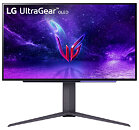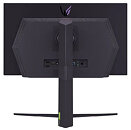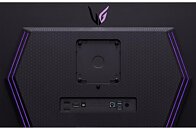TheLostSwede
News Editor
- Joined
- Nov 11, 2004
- Messages
- 17,654 (2.41/day)
- Location
- Sweden
| System Name | Overlord Mk MLI |
|---|---|
| Processor | AMD Ryzen 7 7800X3D |
| Motherboard | Gigabyte X670E Aorus Master |
| Cooling | Noctua NH-D15 SE with offsets |
| Memory | 32GB Team T-Create Expert DDR5 6000 MHz @ CL30-34-34-68 |
| Video Card(s) | Gainward GeForce RTX 4080 Phantom GS |
| Storage | 1TB Solidigm P44 Pro, 2 TB Corsair MP600 Pro, 2TB Kingston KC3000 |
| Display(s) | Acer XV272K LVbmiipruzx 4K@160Hz |
| Case | Fractal Design Torrent Compact |
| Audio Device(s) | Corsair Virtuoso SE |
| Power Supply | be quiet! Pure Power 12 M 850 W |
| Mouse | Logitech G502 Lightspeed |
| Keyboard | Corsair K70 Max |
| Software | Windows 10 Pro |
| Benchmark Scores | https://valid.x86.fr/yfsd9w |
The first flat OLED gaming monitor is here and it's unsurprisingly from LG and part of its UltraGear range of gaming products and goes under the model name 27GR95QE-B. Although it's being touted as a 27-inch display, the screen size is only 26.5-inches, which is a bit unusual. The resolution is 2560 x 1440, with a pixel pitch of 110.8 PPI and the refresh rate goes up to 240 Hz. The OLED panel is capable of delivering 1.07 billion colours and delivers a colour gamut of 98.5 percent of the DCI-P3 standard. LG claims the display has a GtG response time of 0.03 ms which is so far unheard of on a consumer display. LG doesn't supply a brightness rating, nor does the UltraGear OLED appear to have any kind of HDR certification, but supports HDR10, although considering it's an OLED panel, this shouldn't be much of a concern.
There's support for FreeSync Premium and VRR, with the display being G-Sync compatible as well. Other gaming related features include the typical things you'd find on most gaming displays today, such as an FPS counter, a built in crosshair and of course some RGB lighting features. Connectivity wise the UltraGear OLED comes with two unspecified HDMI ports and one unspecified DisplayPort input, as well as one upstreams USB 3.0 port (Type-B) and two downstreams USB 3.0 ports (Type-A). The monitor also has an S/PDIF out and a headset jack, which suggests that it does audio over USB. Finally there's a barrel plug for the 19 V power brick. The display also has support for DTS HP:X where HP stands for headphones, but there are no built in speakers. The stand supports tilt, height, swivel and pivot adjustments and can be adjusted up to 11 cm in height. LG is asking US$999.99 for the UltraGear OLED, which might be a bit more than what most people would be willing to pay for it, but it's at least a first step towards a range of new OLED gaming monitors.




View at TechPowerUp Main Site | Source
There's support for FreeSync Premium and VRR, with the display being G-Sync compatible as well. Other gaming related features include the typical things you'd find on most gaming displays today, such as an FPS counter, a built in crosshair and of course some RGB lighting features. Connectivity wise the UltraGear OLED comes with two unspecified HDMI ports and one unspecified DisplayPort input, as well as one upstreams USB 3.0 port (Type-B) and two downstreams USB 3.0 ports (Type-A). The monitor also has an S/PDIF out and a headset jack, which suggests that it does audio over USB. Finally there's a barrel plug for the 19 V power brick. The display also has support for DTS HP:X where HP stands for headphones, but there are no built in speakers. The stand supports tilt, height, swivel and pivot adjustments and can be adjusted up to 11 cm in height. LG is asking US$999.99 for the UltraGear OLED, which might be a bit more than what most people would be willing to pay for it, but it's at least a first step towards a range of new OLED gaming monitors.




View at TechPowerUp Main Site | Source




